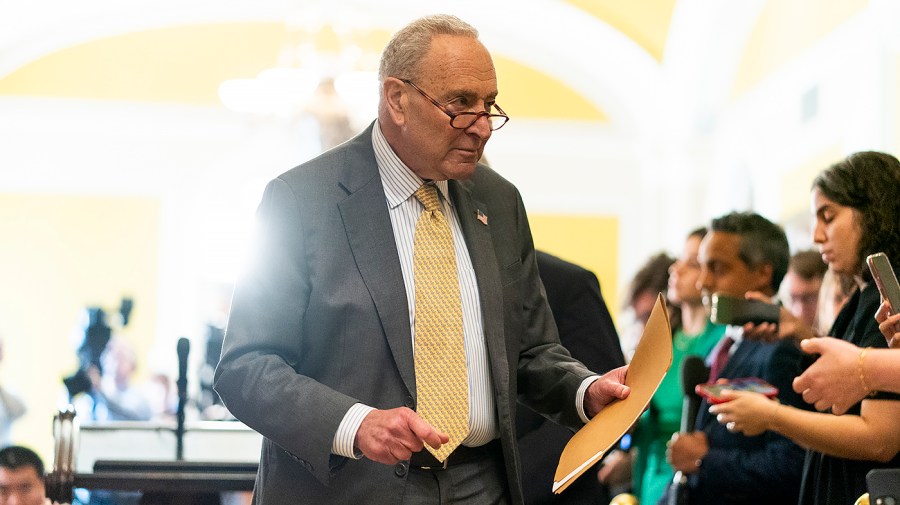Democrats divided over looming government shutdown fight

Democrats are deeply divided over how hard to press their leverage with President Trump and his Republican allies on getting concessions in a bill to fund the government that needs to pass by Sept. 30 to avoid a shutdown.
Senate Democrats held a tense lunch meeting Tuesday to discuss their plan for how to vote on the first spending bill to reach the floor — the Military Construction-Veterans Affairs appropriations bill — as well as their strategy for how to handle the end-of-September government funding deadline.
Soon after that session, which stretched to nearly 3 p.m. EDT Tuesday, Senate Democratic Leader Chuck Schumer (N.Y.) met with House Democratic Leader Hakeem Jeffries (N.Y.) to piece together a strategy as progressives called for them to take a hard line with Republicans.
“It’s hard to negotiate a budget with Republicans right now because they have demonstrated that they will cut a deal and then turn around and change the deal solely to benefit themselves. That’s not a deal, that’s like cutting a deal to buy a car, and then long after the price has been paid, the Republicans want to come and repossess the tires. It doesn’t work that way,” Sen. Elizabeth Warren (D-Mass.) said.
“My views on engaging in pretend negotiations with Republicans who are simply in a power grab and will do whatever Donald Trump tells them to do [is that it] doesn’t make a lot of sense,” Warren said.
Some disgruntled progressives are vowing they cannot repeat the mistake they made in March, when 10 Democratic senators including Schumer voted for a partisan government funding package passed by the House, which cut Democratic priorities and failed to put guardrails on Elon Musk or the Department of Government Efficiency.
Democrats are arguing behind closed doors that they need to make every effort to insist that Republicans agree to bipartisan legislation to fund the government. If Republicans refuse, these Democrats say they should then blame Trump and his GOP allies for any ensuing shutdown.
Democratic lawmakers say Schumer is “afraid” of how a shutdown would play out politically and wants to avoid such a scenario at almost all costs.
At the same time, Democrats warn that if Schumer votes again for a partisan funding package that barely squeaks through Congress with minimal Democratic support, there will likely be a strong backlash from the party base.
Sen. John Fetterman, a Democrat representing swing-state Pennsylvania, argues Congress should do everything it can to avoid a government shutdown that would result in hundreds of thousands of federal employees being furloughed.
“I was the first to say I will never vote to shut the government down, and that hasn’t changed and it’s not going to change,” Fetterman told The Hill.
“Shutting the government down — how could you do that and plunge our country into chaos?” he added.
Schumer acknowledged his dilemma Tuesday, telling reporters he wants to reach a deal with Republicans but complaining that Trump’s allies aren’t making it easy.
“We Democrats want a bipartisan deal. We’re working together to get one, but the bottom line is Republicans are making it much harder — rescissions, impoundment, pocket rescissions directly undoes this,” he said, referring to the rescissions package Republicans passed last week to defund PBS, NPR and global aid programs.
“You can’t say you want a bipartisan process … and at the same time put rescissions on the floor, which is the antithesis of bipartisan,” he said.
Recent polling shows Democrats have a lower approval rating than Republicans. Some Democratic senators think the party’s poor rating stems from a perception that they aren’t putting up enough of a fight against Trump and the GOP.
Sen. Jeff Merkley (D-Ore.), the ranking member of the Senate Budget Committee, is now pushing an amendment to prevent the White House from advancing another rescissions package. He wants Republicans to agree to it before advancing annual appropriations legislation.
Some progressives argue it would be foolish to agree to bipartisan spending bills to keep the government open only to watch Republicans later advance rescissions packages to cut funding for Democratic priorities, such as women’s health care, education and environmental programs.
Democrats are also toying with the idea of insisting Republicans agree to extend enhanced health care insurance subsidies under the Affordable Care Act that are due to expire at the end of the year.
Republicans decided not to do so as part of tax credits extended in Trump’s tax and spending megabill, leaving Democrats warning that millions of Americans will lose their health insurance.
“We had a constructive lunch and we’ve got some very significant issues right in front of us,” said Sen. Chris Coons (D-Del.), the ranking member of the Appropriations Subcommittee on Defense.
Coons said he and his staff is working well with Sen. Mitch McConnell (R-Ky.), the chair of the subcommittee, but cautioned there’s a “real tension” being created by the threat that the White House budget office director, Russell Vought, will send another rescissions package to Congress.
“The next rescission is predicted will go after education,” Coons said. “It was one of the early targets of DOGE [the Department of Government Efficiency]. When they start trying to rescission things like Veterans Administration, defense, Social Security, you get right into the very heart of what impacts the lives of millions of Americans.
And he warned that the “so-called ‘big, beautiful bill’ is going to throw something like 17 million Americans off of health care.”
Coons said he supports Merkley’s amendment to stop future rescissions packages.
“Having a process whereby they can reach a bipartisan agreement with us and then undo it with a partisan rescissions process — in the long-term, that is not a sustainable process,” he said.
Asked about Democrats’ game plan for a government shutdown fight, Coons said: “Lots of things about the appropriations process were discussed.”